Living and teaching in Beijing in the 1970s
Michael Sheringham
Michael is a regular contributor to China Eye. He was an early member of SACU. This article was first published in China Eye, Issue (51) Autumn 2016. It is the second of Michael’s personal memories of the early days of SACU, (see China Eye, Issue 50), and of his time in the Peoples Republic of China.
I was excited and privileged to be invited to teach at Peking University (Beijing Daxue – Beida) in 1972 after years of anticipation while I continued with my Chinese studies in London. It all comes flooding back. Early experiences are often the most memorable, and the welcome by my future colleagues in the Western Languages Department when I arrived at Beijing Airport in late September was a taste of things to come – a wonderful meal there before driving to my new home and work-place. Hitting a dog on the road was not so memorable, my first cultural shock.
Now settled into my new home, the Friendship Hotel in the northwestern outskirts of Beijing, I could begin to orientate myself to my new surroundings. At that time, on clear days, I could see the Western Hills in the distance, shimmering in a blue sky. The intervening countryside in Haidian District was covered by fields of crops and vegetables, only punctuated by the grand Summer Palace, with its Kunming Lake, and before that the village of Zhongguan Cun, still with its alleyways and traditional courtyards. Peking University with its own little lake in a picturesque campus (originally Yenching [Yanjing] University) lay close by, originally part of the vast parkland that formed the Yuanming Yuan (Old Imperial Summer Palace), stretching as far as the new Summer Palace. Among the famous intellectuals who taught at the university in the early 1920s when it was just established were the writer/linguist Hu Shih (Hu Shi), the writer Lu Hsun (Lu Xun) Professors Li Ta-chao (Li Dazhao) and Chen Tu-hsiu (Chen Duxiu), both founders of the Communist Party, and Mao Zedong was a librarian there.
One early and exciting experience was being taken to the celebrations for National Day (October 1, 1972) at the Summer Palace by a Chinese girl student of English at Beida. The park was packed with Chinese holiday-makers, enjoying the sights, stage performances and boating on the lake. There I saw two of the top Chinese leaders, Zhu De and Guo Moruo, watching a show by the lake, and was able to photograph them, although I shyly declined the offer to be introduced to them.
What struck me on leaving the gates of the Friendship Hotel, guarded by PLA soldiers at all times, was the rural-style market opposite, with mountains of cabbages piled up for customers. When I took photographs of this (to me) novel sight, the local women tried to prevent me, as if it was a state secret. The cabbages were in fact stored underground all through the frozen winter, ‘excavated’ for basic food consumption during this period. Nearby was the Evergreen Commune, a large area of farmland run by the neighbourhood to produce vegetables for the whole of Beijing. At our request, I and my sister, who was staying in the university for a couple of months, went to this commune with two girl students to work with the local peasants there during the summer vacation. We spent most of the time chatting to them while we took cover from the rain, and they were also no doubt trying to save of us from the real efforts of manual work.
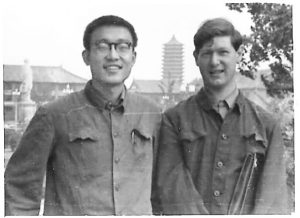
The Friendship Hotel, well-known to past and later generations of foreigners working in Beijing was to be my home for some years, while I was able to move to Peking University for most of the latter half of my 6-year stay. Read any account of foreigners who have lived at ‘Youyi Binguan’ and you will know about their frustrations at being ‘cooped up’ in a fortress-like compound with all the modern facilities, then unimaginable to most of Beijing residents. Like them, I bridled at the prospect, but soon decided to make the best of it and make friends with others from many countries, including Indonesian, Nepalese, Sri Lankan, Thai, Vietnamese, Malaysian, Japanese and even other British. After all, we basically shared a spirit of affection for the Chinese people and interest in their lives and destiny. The trouble was that we could not share their lives at closer proximity, and many of the younger foreigners, especially the ‘radical’ ones from European countries, soon became frustrated with the restrictions and protective measures which they encountered both in their residence and in their work places.
When I started teaching at the university at the beginning of the new term the distance closed considerably. I soon declined the privilege of being chauffeured to the university and bought a bicycle and cycled the 15 minutes’ journey to the university. I also tried to avoid being treated with excessive politeness by my students, who started by standing up when I entered the class-room. Of the 150 in the first group and now in their third year, most were from the PLA armed forces – air force, navy and army. They always wore their military uniforms, so perhaps the discipline of saluting their officers was familiar to them. But it was not what I expected (as a young man of 26, who had read a fair amount about Westerners’ dominance of China during the previous one and half centuries), nor did it chime well for me with the principles of equality and revolutionary pride which I expected from these radical youth of the Cultural Revolution. So I dismissed this particular polite display of respect and made every effort to break down the barriers between teacher and students.
It was, of course, more difficult for the Chinese teachers to adapt to the new political climate and educational environment, since they were used to the traditional relationship between teachers and students even during the period of Socialism. During the Cultural Revolution, which broke out in 1966, Mao Zedong called on the youth to rebel against all forms of authority. I had expected that this often violent movement carried out by the Red Guards would have destroyed that elitist barrier, and that the teachers and educational authorities would have been humbled if not intimidated. But old ideas still obviously endured in spite of the harsh treatment that the teachers had had to endure during this period of upheaval. They tried their best to adapt to the new circumstances and requirements of the ‘Revolution in Education’, and to a great extent they succeeded. There was a new leadership in charge of the university consisting mainly of army personnel, with workers supervising every faculty, but the Vice-Chancellor was a senior scientist and the old professors once again enjoyed the traditional authority even if under the leadership of Party officials.
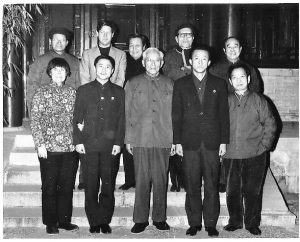
So in this somewhat paradoxical situation, I, a ‘Foreign Devil’, with the old academics, some Party members, and political supervisors, prepared English texts and lessons to teach the new generation of students from worker-peasant-soldier backgrounds in a new and revolutionary way. I was teaching with another English couple, who had taught in China before the Cultural Revolution, and other foreign teachers taught other Western, Arabic and Asian languages. We all certainly had to adapt our thinking and methodology to the requirements of the time and of the students, who were among the first years of intake after the ‘hiatus’ of 4-5 years, when universities closed during the upheaval of the Cultural Revolution.
One of the main features of the teaching material which I was asked to write for the students’ spoken English course was practicality. I prepared dialogues in colloquial English based on situations which they were likely to need in their immediate situations. These often involved visiting places in and around the university, such as the clinic, pharmaceutical laboratory, library, sports ground or middle and primary school attached to the university. Having practised some of these dialogues in the classroom, I went with students to the actual places, where they acted as interpreters for me as a foreign visitor. These visits would prepare the students for real situations when foreign visitors came to visit the university, including SACU groups and Ted Heath, the British ex-Prime Minister, who spoke with the students in May1974.
After my first visit back to the UK after two years, I travelled around the country, visiting places which I thought might be of interest to my students – not the usual historic sites, but the old mining areas with their museums of the industrial revolution and the country houses of the aristocracy, which showed how ‘the other half’ lived. I wrote texts and dialogues as teaching material for the students to practice as if they were visitors with myself as guide. I must admit that I presented these views of Britain with a certain political slant. I and my English colleagues also gave talks to our students about British history and aspects of society and people’s lives, which supplemented the background texts on English literature and other aspects which the Chinese teachers prepared for them.
In fact, the Chinese leadership, with Premier Zhou Enlai playing a crucial role, promoted teaching English and training teachers of English in his diplomatic drive to ‘open up to the world’. Apart from calling Beida English students to discuss this promotion of English himself, Zhou instigated a National Conference on Education and Scientific Research under the Minister of Education, Zhou Rongxin in 1972. The main thrust of the educational policies in this period of the ‘Revolution in Education’ was the balance of ‘Red’ and ‘expert’, emphasising political ‘working-class’ educational priorities, while attempting to raise academic standards.
In effect, this was a turning-point, where the ‘professionals’ won Zhou Enlai’s support to pay more attention to ‘expertise’. Following the ‘Red’ principle, teachers were still encouraged to help students from ordinary (particularly rural backgrounds) to keep up their studies by giving them extra tuition and encouragement. I also did this with specially selected groups of ‘slower-learning’ students. “The conference also advocated the ‘open-book’ method of examinations, whereby students could freely refer to textbooks.” (quote from my talk to SACU in July 1977.)
Another basic principle in education at that time was combining study in the classroom with work experience (‘bangong banxue’) both within and outside the university, or schools. My students and their Chinese teachers had spent a year in the countryside in Jiangxi Province, working on the land to reclaim marshland in harsh conditions. When they came back to the university, they did regular stints of manual work on projects such as building the foundations of the new university library. I sometimes found them not in the classroom for English lessons, but on the campus digging ditches or laying bricks with their teachers and political supervisors (from the army leadership in each department). They often sang songs as they worked, and I insisted on joining them in their work as far as I could. One problem I found was that the teachers didn’t practise English with the students on these occasions, probably because the political supervisors, who didn’t speak English, would have criticised them for doing this. I think I broke this barrier, although I also tried to practise my Chinese outside class whenever I could.
The students also went out to practise their English in various ways, organised by the foreign language department. Some of our third-year students had spent several months in Shanghai acting as interpreters for Africans working at the docks in the year before I taught them (1971). The second group of students (entry of 1971), who were termed ‘educated youth’ and wore civilian, Mao-style clothes rather than uniforms, went to work in hotels in Beijing for several weeks, where they did various basic tasks and had contact with early foreign visitors, such as the American Guardian newspaper group. This group happened to include my aunt and uncle from New York, who were visiting China for the first time as progressive activists in the civil rights movement. I went to visit them and my students at Minzhu Hotel in Chang’an Boulevard on several occasions.
When such friendship groups came to visit the university, they were usually received by the Vice-Chancellor, Professor Zhou Peiyuan, a suave intellectual who spoke fluent English, in the ‘Hall by the Lake’, and I was invited with some of my students and their Chinese teachers to attend these sessions and take the guests around the campus. Although I found these good opportunities for the students to practise their English and for the visitors to get closer to the lives of the students, I was frustrated by the cultural/political barriers which I felt were manifested by the stilted language (full of political slogans) of the students which hampered mutual understanding. I tried my best to act as an intermediary or even interpreter as they struggled to explain why they were studying English, how they were selected and what the aims of their education were. So much for the colloquial English language which I was teaching them!
When the first year of students were preparing to graduate after three and a half years (shortened from the original pre-Cultural Revolution course of 4-5 years), they carried out a movement to sum up their progress in transforming education at the university. Apart from discussions and debates, they used ‘big-character posters’ to express their opinions, which were often criticisms or warnings to the teachers to beware of falling into old ‘bourgeois’ habits of teaching and standing aloof from their students, particularly the worker-peasant students. I remember one tough-looking army student coming up to me as I was reading these posters and asking me what I thought of them. I told him that I agreed with them (of course!), but realised how intimidating these young, zealous ex-Red Guards could be. I was pretty radical myself, suggesting that barriers between ‘town and gown’ could better be eliminated by knocking down the old wall which surrounded the campus and integrating with the surrounding neighbourhood.
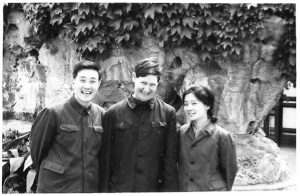
With most of the foreigners living in China and the Chinese leaders of our various work places, I was privileged to participate in an important event on March 8, 1973, a meeting in the Great Hall of the People where Zhou Enlai addressed us about the official policies regarding foreigners living in China. As we sat at the round dining tables allocated to each work place (in my case, Peking University), Zhou talked for about 3 hours, declaring that Mao’s policies were internationalist and welcoming to friendly foreigners. He denounced Lin Piao (Lin Biao), the former Minister of Defence and Mao’s designated successor (who had died in a mysterious plane-crash in 1971), as a ‘renegade’ and apologised on behalf of the Government and Party about the wrong ‘ultra-leftist’ policies which had victimised foreigners during the height of the Cultural Revolution. Many had been wrongly imprisoned and had only just been released after years of captivity and were now present at this meeting. Zhou made a point of walking around the hall and greeting those at each table.
At our Beida (Peking University) table he stopped to make a particular point about one family with whom I was closely acquainted. Marcelia Yeh was a long-time American resident in Beijing, who was teaching English with me at the university. She had been married to a Chinese scientist who had died some years previously, and was bringing up her children in the residence of the Academy of Science nearby. Zhou had heard that her son was in love with a Chinese girl working in a factory with her son, but that her family had her sent away into the countryside to prevent the two from deepening their relationship. He instructed the university leaders to have the girl brought back to Beijing and to make sure that her parents or any other authorities should not interfere in their relationship. It was Mao’s policy, he said, that Chinese could marry foreigners and international relations should flourish. It was also significant that Mao’s wife, Jiang Qing, was also present on this occasion, presumably ‘forced’ to attend as a snub against her ‘ultra-leftist’ policies, which had caused factionalism and incited anti-foreign sentiment during this period. Apparently, she spoke not a word to the foreign friends at her table, bearing a sullen demeanour throughout the proceedings.
Zhou Enlai’s efforts to promote a more open foreign policy and professional approach to academic and scientific research could be felt in many ways as more foreign students came to study Chinese at the university and language colleges, while the English teaching material itself included texts based on diplomacy. A speech of Ch’iao Kuan-hua (Qiao Guanhua – Deputy Foreign Minister) to the UN, for instance, was one of the texts which the Chinese teachers used to teach to the first group of students. While Zhou and the reinstated Teng Hsiao-ping (Deng Xiaoping) emphasised training experts and professionals (the ‘Expert’ school), the ‘Reds’ continued to push for popularising skills and political (Marxist) aspects to be the determining factors in education. In another campaign ‘to oppose the rightist trend..’, the radicals argued in the media and Party directives against ‘back-sliding’ and a reversion to elitist tendencies in every aspect of cultural and educational policies.
At the university in 1975, there were discussions amongst students and teachers, which I attended, about how to promote another educational campaign based on the ‘Chaoyang experience’. Chaoyang was an agricultural college in the northeast which had pioneered and promoted teaching even more closely related to the students’ practical experience in the fields. When the national media extolled this educational experiment, the universities, and each department, were called upon to discuss how to follow this Chaoyang ‘model’ in their respective disciplines. This was obviously not so easy to implement in the cultural and linguistic subjects, but it was decided that the Western language department students and their teachers would move to a rural area outside Beijing to pursue their courses. This was a more drastic measure than doing brief stints of working and studying in field and factory, as it involved moving furniture and equipment such as heavy tape-recorders out of the campus and into the countryside.
As foreign teachers, we were not expected (or indeed allowed) to go with the Chinese students, but remained back on the campus to compile teaching material and teach a group of teachers who came back once a week. I was also assigned to teach Vietnamese and North Korean students who were studying English at the university. Now, after two years of ‘proving my reliability’, I had been invited to move to a dormitory on the campus, which was the accommodation for foreign students and some of their Chinese class-mates.
I was, of course, delighted to teach these ‘Socialist brothers and sisters’ and much enjoyed living and eating with them, but I argued with my English department leaders that I had come to teach the Chinese students and teachers and would like to join them in their new venture. This request, vigorously supported by my previously-mentioned American colleague, was refused (on the grounds that it was ‘subjective’ – another term for selfish) and that we could best serve revolutionary and educational needs by visiting the students once a week to teach them on the spot at their rural base in Dongxing County near Beijing. I remember how we were taken there and back in a jeep and freezing on the way! Learning about their life and work there provided the basis for the teaching material which we prepared for them and got them to practise during our teaching visits. We did, however, join our Korean and Vietnamese students and their Chinese teachers, when they went to the countryside near Beijing to do manual work in the fields for a week.
While this experiment lasted about a year, and was widely broadcast in by media, the rear-guard reaction of the conservative or ‘right-wing’ faction and their academic followers could be sensed in many ways. Deng Xiaoping was dismissed from office again and criticised in the press, on big-character posters and at meetings, which we foreign teachers attended for our own ‘education’. There were campaigns to extol educational heroes like Huang Shuai, who criticised her teacher for being ‘bourgeois’ or ‘elitist’ or Zhang Tiesheng, a country boy who refused to take the ‘bookish’ entrance examination. A very radical film ‘Fanji’, Counterattack, dealing with the ‘Revolution in Education’ and how some old-style academics were trying to sabotage it, was produced in October 1976, but only shown as ‘negative propaganda’ after the political tide had turned again.
It all changed in the traumatic year of 1976. In January, Premier Zhou died of cancer and a popular commemoration of his life by thousands of people laying wreaths in his memory in Tiananmen Square in April was crushed and condemned by the current authorities. I passed by the Square in a taxi, but was advised not to stop there as trouble was expected. This led to the final overthrow of Deng Xiaoping and the appointment of Hua Guofeng as Zhou’s successor and Vice-Chairman. A few months after this, the revolutionary army leader, Zhu De, and then Mao Zedong passed away. In between, in that long hot summer, there was a massive earthquake in Tangshan near Tianjin, and the effects of this and aftershocks could be felt in Beijing.
I was travelling in the mountains of Jinggangshan with my parents and a Chinese teacher at that time, when we heard the devastating news, assuming that it was actually a political earthquake. In a sense, it was too, as we witnessed not only the survivors being transported to the south to recuperate in sanatoria in Wuxi, where we were also seeking sanctuary, but also lorries full of ‘condemned’ (as we assumed) political prisoners being paraded to meet their fate. This scenario was, as it turned out, the last throw of the dice of the radical ‘ultra-left’ movement to gain supremacy before Mao died. And the rest is history…
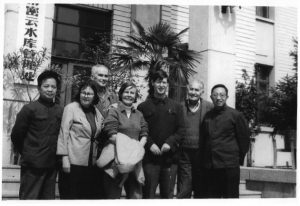
My parents returned to London via Shanghai and Hong Kong, and I and my colleague went back to Beijing, where we stayed in temporary ‘tents’ (sheets over bunk beds) at the university while the aftershocks from the earthquake still threatened the buildings. Our students went off to join the soldiers to do rescue and rehabilitation work in the stricken and flattened city of Tangshan (a quarter of a million dead). When they returned to the campus and resumed classes, they reported to me in English about their exploits – except that they said nothing about their own experience, only mechanically repeating what they read in the newspapers (“Man’s Will Overcomes Nature!”). It was only 40 years later when I saw a feature film, Aftershock (‘Tangshan Da Dizhen’, directed by Feng Xiaogang, 2010), about the real experience of those terrible events and how they affected ordinary people that I relived them and cried.
Mao’s death and the subsequent overthrow of his followers, his wife Jiang Qing and the others known as the ‘Gang of Four’, were terrible events which played out like a Greek tragedy or Beijing Opera. Seeing how the students and teachers at the university prepared wreaths in sullen and sad composure seemed an expression of genuine admiration and grief for the loss of their leader and symbol of their revolutionary history. I and other foreigners were taken to pay tribute as Mao lay in state in Tiananmen, but the wailing and crying there, on the other hand, seemed traditionally operatic.
I was shocked when the news about the arrest of a group of Mao’s ‘left-wing’ associates in the leadership was announced on the BBC radio news that November morning, and when I told one of my students about it, he exclaimed “This is terrible if it is true!” He and others were soon celebrating their downfall in public demonstrations. When I went to my office in the Western Languages Department later that day, the head of the department, a German-speaking academic whom I knew well over the years and liked, took me aside and expressed the relief and joy which he and other academics and intellectuals felt at hearing this news. “We are at last really free, but we couldn’t tell you all these years how suppressed we felt”, was his spontaneous reaction to these events. I could appreciate the conflict these intellectuals had felt in their academic and often official Party roles, but I could never understand how they had managed to put on a different face all through these years.
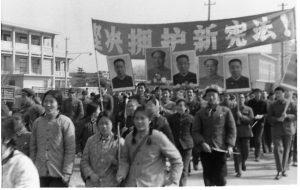
During the celebrations for the ‘Gang’s’ demise and the appearance of the new leader and Chairman, Hua Guofeng, I marched with my students down Chang’an Jie, waving banners and taking photographs, but this seemed to be just another performance of Beijing Opera in a new guise. It would herald another (and the biggest) reversal of China’s recent history, and a new campaign to condemn almost everything that had been applauded during the years I had been living in Beijing. I felt sorry to see my students from ordinary backgrounds being undermined by the new policies which were soon introduced in education. Their achievements in studying English were belittled by the new intake of students from mostly intellectual and urban backgrounds, who had to pass rigorous entrance exams to this prestigious university and others like it. At least one professor expressed how relieved he was not to have to struggle to teach these students from poor and poorly-educated families, who found it so hard to learn a foreign language. I continued to teach these students for another term, but they graduated soon after I left for England in the Spring of 1978 without the qualifications that graduates from such a university deserved. No other English teacher had continued to teach them and they had no more colloquial English oral classes before they graduated. It was the end of an era and the end of my time in Beijing too.
Postscript: In the following years I met several of my old students when I went back to the university or when they came abroad. A good many went on to study abroad, mainly in the US, gaining PhDs and becoming successful academics. Recently, I met one of my old army students from the first group which I taught. He went on to work in the army as an interpreter and was later transferred to a Chinese state company working in several countries in Africa for many years. His two daughters studied in the UK and one has settled here with her Chinese husband and children. Generally, this generation has adapted very well to the new times and learnt new skills to enable them to be successful and provide even more opportunities for the next generation – those who are really at home in this globalised world economy and culture.